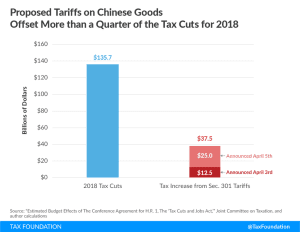Modeling the Impact of President Trump’s Proposed Tariffs
The Trump administration’s proposed tariffs would lead to job losses and a reduction in economic growth, as the Tax Foundation’s updated Tax and Growth model shows.
4 min read
The Trump administration’s proposed tariffs would lead to job losses and a reduction in economic growth, as the Tax Foundation’s updated Tax and Growth model shows.
4 min read

Amending the Illinois constitution and adopting a graduated-rate income tax cannot solve the state’s fundamental problems. Instead, it doubles down on an already uncompetitive tax code.
16 min read

The Tax Cuts and Jobs Act improved the US tax code, but key provisions are only temporary. Now Congress may vote to ensure those tax breaks are permanent.
3 min read


States considering legalizing and taxing marijuana should pay attention to natural experiments occurring in states across the country.
4 min read

The proposal includes some good reforms, including conforming to the federal full expensing provision, but also rolls back some recent positive changes.
2 min read
Facts and Figures is a one-stop data resource comparing the 50 states on over 40 measures of individual and corporate income taxes, sales taxes, excise taxes, property taxes, business tax climates, and more.
1 min read

The Trump administration’s plan to levy $60 billion in tariffs on Chinese products could negate 20 percent of the benefits of the recently adopted tax cuts.
3 min read
Failure to reverse this newly adverse treatment of capital investment makes it less likely that businesses will invest in Pennsylvania.
15 min read




The Tax Cuts and Jobs Act was meant to boost growth and deter corporate inversions. What does it mean that an Ohio company is still moving its HQ to the UK?
5 min read